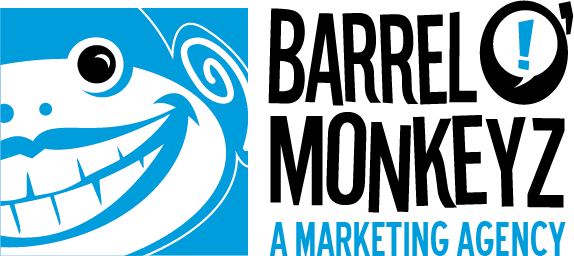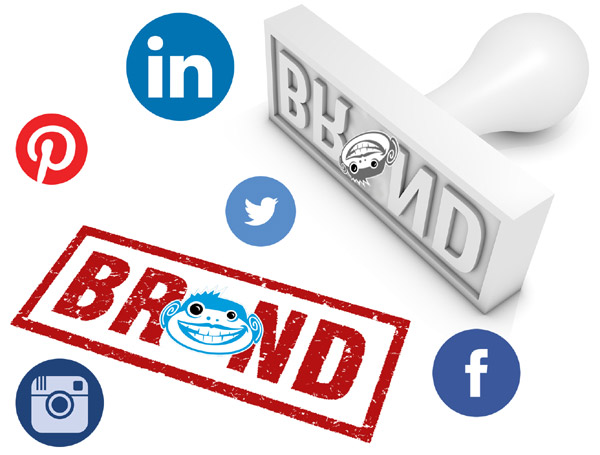With a personal slogan of “More Creativity, More Ideas, More Fun!” and a company logo that feature’s a blue monkey with a big, wide grin, it should come as no surprise that humor finds its way into my social media posts and blogs quite often.
Humor is an important part of who I am and thus an important part of “Paul June’s” brand story.
Just the other day, someone questioned whether me posting a joke on LinkedIn was an appropriate use of that forum.
I believe it was . . . and that it is.
Humor is important, whether it’s in our personal lives and relationships, around the dinner table, standing in line at the movie theater, on lunch break, or even in the board room.
I find humor energizing. It helps ease tension. Compare otherwise dry business speeches that use a bit of humor to those that do not. Which is more engaging?
With my Barrel O’ Monkeyz crew, humor is an important part of the “glue” that binds us together as a team. It’s an important part of our brand story. It frees our minds and leads to creativity.
Of course, there’s a time and a place for everything. Too much of anything—even a good thing—gets old. In business, there’s a time and a place for humor, just as there’s a time and a place for being serious.
So I’m not suggesting we turn LinkedIn into another Facebook, complete with favorite cat pictures, Farmville updates, and shout outs to long lost classmates. What I’m suggesting is that it’s good, even necessary, for all of us to lighten up once in a while—after all, “All work and no play makes Jack (or Jill) a dull boy (or girl)”—and that for me, doing so is consistent with my brand and the expectations of my target audience.
Here’s the LinkedIn post that had one of my contacts questioning if telling jokes on a business site was relevant:
“Dad, are they allowed to put two people in the same grave?”
“I don’t think so, son. Why do you ask?”
“Because that headstone over there says, ‘Here lies a lawyer and an honest man.'”Admit it, even if you are a lawyer, you chuckled a bit, didn’t you?
I know through analytics and feedback from members of my target audience that they enjoy having the monotony of dull business articles broken up with my occasional jokes. As for those who do not, they’re most likely not in my target audience . . . and you can’t please everyone (nor should you try to). For them, they always have the choice to read something I post or not, or to follow my feed or not.
About 10 months ago, this same topic came up concerning my posts dealing with religious quotes. I said it then and I’ll say it again here: posting religious quotes (and jokes) “works for me and is part of who I am, and I am proud of it.”
What say you?
Here’s that blog again. Enjoy!
I Know My Brand . . . Do You Know Yours?
(Originally Posted on April 9, 2014)
Feedback is how we know we are doing something right; it’s also how we know when we’re doing something wrong. Feedback is necessary. It’s how we improve our relationships and raise our golf (or in my case, volleyball) game to the next level; it’s also how we fine-tune our business offerings and hone our brands.
I love getting and giving feedback.
On the personal side, feedback is important for growing and nurturing relationships with friends and family and loved ones. As a marketer and a business entrepreneur, feedback is necessary for the care and feeding of my business relationships and network, and it’s how I know if my message is getting out and whether or not my brand is clear.
That’s why I encourage readers of this blog and my followers on Facebook, Twitter, and LinkedIn to comment on my posts. Generally, your comments help me know if my message/brand is being received as intended or whether I need to refine my approach.
Every now and then, though, I get feedback that makes me step back and think, what is my brand? Do I truly know it, and am I communicating it effectively?
Recently, my inspirational, daily religious quote elicited the following response from a long-time LinkedIn contact, creative branding specialist, and friend:
Re: Ponder This
Hey Paul – hope all is well, but I have a question for you.
Do you think religious scripture – regardless of what one’s faith is – is appropriate for LinkedIn, a business site?
Do you see any other posts like that?
Those of you who read this blog regularly or follow me on Facebook, Twitter, and LinkedIn know that my beliefs and values are worldly with a Christian focus. I make no attempt to hide this. Authenticity and being true to my beliefs and values are important to me. You also know that I do not try to juggle both a “business brand” along with a “personal brand.” There is only one Paul June, so there is only one Paul June brand.
Thus my reply—
It works for me and is part of who I am, and I am proud of it. I respect all religions and enjoy seeing when others post (which is seldom to your point). Feel free to disregard. Hope all is well and I like your comment.
— was really the only reply possible so that I could stay true to myself and to my brand.
Some of you may be thinking this flies in the face of the old adage, “never mix religion and politics with business or polite company.” In other words, why go there if I don’t need to?
It’s simple, really. I choose to “go there” because doing so reveals something about me as a person; it’s not an attempt to sway others to my point of view. It’s who I am. It’s my brand.
… and pull a few tails along the way.
I know my brand . . . do you know yours?
- I know my brand.
- I know my audience.
- Analytics speak to it.
- “Daily Religious Quotes” speak to it.
- “Daily Quotes” speak to it.
- People who do business with me value it.
- My personal slogan is “More Creativity, More Ideas, More Fun!”
- My target audience covers consumer (people) products and can be broken down into consumer electronics, toys, gifts, apparel, sports, outdoor retail, action sports, general retail, digital media, social media, web site development, SEO/SEM, marketing, and branding.
- One of my goals with this blog and through social media is to inspire, motivate, and energize others by providing what I think is entertaining, informative, and enriching content.
In the end, it’s all about being genuine and “real” to your audience. It’s about knowing your brand. In the immortal words of a certain, spinach-eating cartoon character, “I yam what I yam and that’s all what I yam.”
So now you know how I responded to the “Ponder This” comment. How would you have replied? Please share with others. I look forward to and invite your feedback.
Special Thanks to Chris Gregg, Jamie Blattstein, Matt McGovern and Monkeyz Business Nation for their inspiration, feedback, and support.


Trackbacks/Pingbacks